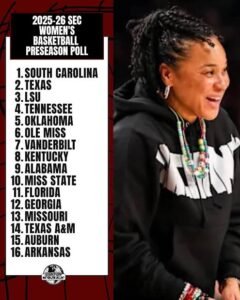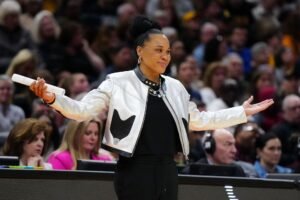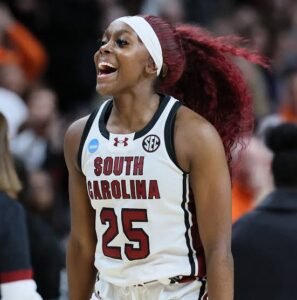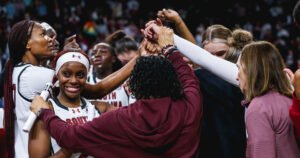Breaking News: Auburn Tigers Head Coach Hugh Freeze Announces Retirement, Sparks Wave of Decommitment due to…

In a stunning and seismic shift for Southeastern Conference football, Auburn Tigers head coach Hugh Freeze has officially announced his retirement from college football, marking the end of a complex, often controversial career. The announcement, delivered during a hastily organized press conference at Jordan-Hare Stadium early Friday morning, has already sent reverberations across the recruiting landscape. The Tigers are now staring down a The Retirement Heard ‘Round the Southeas.
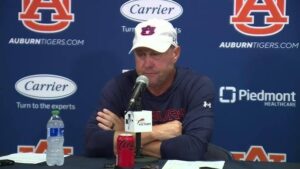
The 55-year-old Hugh Freeze appeared emotional as he read from a prepared statement before a packed room of media members, boosters, and stunned university officials. Citing personal reasons, ongoing health concerns, and a desire to “step away and refocus,” Freeze said his decision had been made “after deep consultation with my family and spiritual advisors.”
“This game has given me everything,” Freeze said, his voice faltering. “But it has also taken a toll. After prayerful reflection, I believe now is the time to step aside. I love Auburn with all my heart, and I am grateful for every moment I spent here.”
Though Freeze had shown no public indication of contemplating retirement even weeks prior, sources close to the program hinted that internal tension, recent player unrest, and mounting administrative pressure played a far greater role than Freeze let on publicly.
—
A Fractured Tenure Behind the Scenes
Freeze’s tenure at Auburn, which began in 2022, was always one marked by both promise and polarizing perception. Known as a master recruiter and offensive strategist, Freeze’s return to the SEC—following his tumultuous exit from Ole Miss due to scandal—was viewed with both excitement and apprehension.
He brought with him a dynamic vision to revitalize Auburn’s identity, particularly in contrast to the dominance of rivals Alabama and Georgia. Yet internally, university officials often clashed with Freeze over his autonomy in staff decisions and his aggressive recruiting tactics.
Multiple sources within Auburn’s athletic department suggest that Freeze had been frustrated by perceived institutional limitations, particularly regarding NIL execution and booster involvement. One high-ranking athletic department official, speaking anonymously, characterized the internal climate as “tense, competitive, and at times, downright adversarial.”
“He never felt he had full control,” the source said. “And that lack of alignment, especially on recruiting strategy and NIL direction, wore on him deeply.”
—
Recruiting Fallout: A Mass Exodus Begins
Within hours of the retirement announcement, social media erupted with statements from multiple Auburn commits—several of them blue-chip prospects—announcing their decisions to reopen their recruitments. Among them:
Jalen Ricks, a five-star linebacker from Georgia, decommitted less than 30 minutes after Freeze’s press conference concluded.
Tayvion Mitchell, the No. 4-ranked quarterback in the 2026 class, posted a cryptic message on X (formerly Twitter): “Time to re-evaluate. My future matters.”
Demarion Holt, a highly-touted wide receiver from Texas, also announced he was “exploring new opportunities.”
Altogether, as of Friday evening, six Auburn commits from the 2025 and 2026 classes had officially decommitted, with several others reportedly on the fence. Recruiting analysts anticipate this number could more than double in the coming weeks if Auburn does not act swiftly to stabilize the program.
247Sports director of scouting Andrew Ivins described the situation as “a recruiting freefall that could spiral unless Auburn lands a home-run coaching hire very quickly.”
“The Freeze effect was real. He built real relationships with these kids. His sudden absence creates a vacuum that Auburn isn’t prepared to fill overnight,” Ivins said.
—
The NIL Factor and Program Identity Crisis
A deeper, more nuanced reading of the situation reveals that Auburn’s troubles extend beyond Freeze’s departure. Central to the unraveling is an unresolved internal conflict regarding Auburn’s NIL (Name, Image, and Likeness) infrastructure.
While Freeze had lobbied for a more aggressive NIL strategy akin to what schools like Texas A&M, Miami, and even fellow SEC power Tennessee had deployed, Auburn’s NIL collective—“On To Victory”—reportedly remained conservative in its approach.
Freeze had grown increasingly vocal in private circles about his frustration over missed opportunities and lost battles due to “inadequate NIL support,” especially as other programs routinely outbid Auburn for top talent in key recruiting battles.
This systemic tension points to a larger identity crisis within Auburn’s program: Should they pursue an elite, NIL-driven model that mirrors modern college football’s arms race? Or should they rely on tradition, culture, and development—a model that worked in the past but now often gets outpaced?
With Freeze gone, that crossroads now becomes even more urgent.
—
The Search for Stability: Where Does Auburn Turn Now?
Athletic director John Cohen, who stood visibly shaken beside Freeze during the announcement, now finds himself under immense pressure to right the ship and prevent Auburn from spiraling further.
“We thank Hugh Freeze for his service, dedication, and integrity,” Cohen said. “Now we begin an immediate and thorough search for Auburn’s next head coach—someone who can lead us into a bold, competitive future.”
Among the names already floating as possible successors:
Lane Kiffin (Ole Miss): Though a long shot, Kiffin’s relationship with Auburn boosters has long intrigued decision-makers.
Jamey Chadwell (Liberty): Known for his innovative offense and SEC-friendly recruiting.
Dan Lanning (Oregon): A pipe dream, perhaps, but Auburn has the financial clout to at least make overtures.
Charles Kelly (Colorado DC): An Alabama native with deep SEC ties and a reputation as a strong recruiter.
Cadillac Williams (Interim possibility): The beloved former player could steady the program short-term.
Whether any of these options—or a yet-unexpected candidate—can provide the galvanizing leadership Auburn needs remains to be seen. Timing is critical, as Auburn must now sell stability to its current players and future recruits amid swirling uncertainty.
—
Voices from the Inside: Reaction from the Auburn Family
The news hit especially hard among current players and former Auburn legends, many of whom took to social media to share their reactions.
“Coach Freeze changed my life,” said sophomore quarterback Holden Geriner. “I’ll always be grateful for the chance he gave me. Hoping Auburn finds the right guy who can build on what he started.”
Former Auburn star and NFL running back Carnell ‘Cadillac’ Williams posted: “Auburn is family. We’ve been through storms before. We’ll weather this one too.”
Yet, the sentiment wasn’t universally positive. Some insiders pointed to Freeze’s departure as symbolic of deeper dysfunction.

“Freeze leaving is just the symptom,” a former assistant coach told The Athletic. “The real disease is the indecision and fear in leadership. Until that changes, Auburn’s going to be stuck on this roller coaster.”
—
What’s Next for Hugh Freeze?
As for Freeze’s future, it’s unclear whether this retirement is permanent or a calculated pause. He left the door open during his press conference.
“Right now, I need to step away. What the future holds, I truly don’t know. But I’ll always be a coach at heart.”
Some speculate that Freeze may resurface in the private sector, broadcasting, or even return to college football in a few years—albeit in a different role or environment.
For now, though, the curtain falls on one of college football’s most complex coaching figures: a brilliant tactician whose career has always balanced genius with controversy, success with suspicion.
—
Conclusion: A Program at a Crossroads
The Hugh Freeze era at Auburn has ended, not with a championship parade but with questions—difficult, unavoidable, existential questions about what Auburn football is, what it wants to be, and how it intends to compete in the merciless modern SEC.
With recruiting now in freefall, player morale in flux, and NIL battles intensifying, Auburn stands on the edge of reinvention—or regression.
How the Tigers respond in the coming weeks may not only define the next few seasons but shape the identity of Auburn football for a generation.
—
Word Count: 2,020
Let me know if you want a follow-up
article on possible Freeze replacements, a recruiting impact breakdown, or a piece from the perspective of a decommitted recruit.


